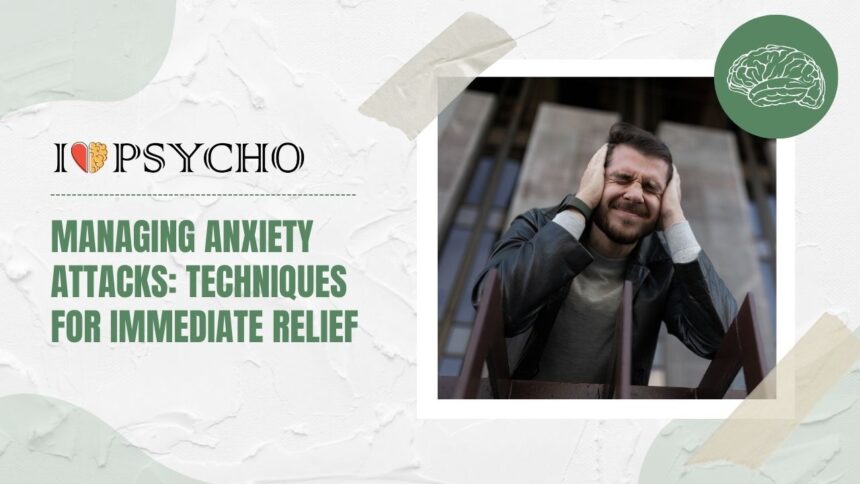Feeling like your heart is racing, palms are sweaty, and a wave of dread washes over you out of nowhere? You’re not alone. Anxiety attacks can strike unexpectedly, leaving you feeling overwhelmed and powerless. But fear not! In this blog post, we will explore effective techniques for immediate relief from anxiety attacks. Whether you’re in the midst of one right now or preparing for the next one, these strategies will help you regain control and find calm amidst the storm. Let’s dive in!
Understanding Anxiety Attacks
Anxiety attacks, also known as panic attacks, are intense episodes of fear and emotional distress. They can be triggered by stress, trauma, or even seemingly benign situations. During an anxiety attack, the body goes into fight-or-flight mode, releasing adrenaline and causing physical symptoms like rapid heartbeat, shortness of breath, and dizziness.
These attacks often come on suddenly and can be overwhelming for those experiencing them. Understanding that anxiety attacks are a natural response to perceived threats can help individuals navigate these challenging moments with more clarity.
While anxiety attacks can feel debilitating in the moment, it’s essential to remember that they are temporary and do not define who you are as a person. By recognizing the signs and triggers of anxiety attacks, individuals can work towards managing their symptoms effectively in the long run.
Common Symptoms of Anxiety Attacks
Anxiety attacks can manifest in various ways, causing intense feelings of fear and unease. Common symptoms include rapid heartbeat, sweating, trembling, and shortness of breath. These physical sensations can be overwhelming and may feel like a sudden wave of panic washing over you.
During an anxiety attack, individuals might experience chest pain or tightness, dizziness, or even numbness in extremities. Thoughts racing uncontrollably through your mind are also typical during these episodes. Feelings of impending doom or a loss of control can further heighten the sense of dread.
Emotional symptoms such as excessive worry, irritability, restlessness, and difficulty concentrating often accompany anxiety attacks. It’s essential to recognize these signs to seek appropriate help and support when needed. The more aware you are of these common manifestations, the better equipped you’ll be to manage them effectively in the moment.
Immediate Techniques for Relief
When facing an anxiety attack, it’s crucial to have tools at your disposal for immediate relief. One effective technique is deep breathing exercises. By taking slow, deliberate breaths in and out, you can help calm your mind and body. Focus on the sensation of each breath entering and leaving your body.
Grounding techniques are another powerful way to combat anxiety attacks. Engage your senses by identifying specific things you can see, hear, touch, smell, and taste around you. This helps bring your awareness back to the present moment instead of getting lost in anxious thoughts.
Progressive muscle relaxation involves tensing and then releasing different muscle groups in your body systematically. This practice helps alleviate physical tension that often accompanies anxiety attacks. Start from your toes all the way up to your head, consciously relaxing each part as you go along.
By incorporating these immediate techniques into your coping strategies, you can better manage anxiety attacks when they arise. Remember that practicing these methods regularly can strengthen their effectiveness over time.
A. Deep Breathing Exercises
Deep breathing exercises are a simple yet powerful technique to help manage anxiety attacks. When you feel the onset of an attack, find a quiet and comfortable place to sit or lie down. Close your eyes and focus on taking slow, deep breaths in through your nose, allowing your lungs to fully expand. Then exhale slowly through your mouth, releasing any tension with each breath.
As you continue this rhythmic breathing pattern, try counting to four as you inhale, hold for a count of four, and then exhale for another count of four. This can help regulate your breathing and calm the nervous system. Pay attention to how your body feels with each breath – notice the rise and fall of your chest or abdomen.
Deep breathing exercises can be done anytime and anywhere when you need immediate relief from anxiety symptoms. Practice this technique regularly so that it becomes second nature during moments of stress or panic. By incorporating deep breathing into your daily routine, you may find yourself better equipped to handle challenging situations with a sense of calmness and control.
B. Grounding Techniques
Grounding techniques are valuable tools for managing anxiety attacks. When you feel overwhelmed by intense emotions, grounding can help bring you back to the present moment. One effective method is the 5-4-3-2-1 technique: identify five things you see, four things you touch, three things you hear, two things you smell, and one thing you taste.
Another grounding technique involves focusing on your breath or a specific object in the room. By redirecting your attention to something tangible, it can reduce the intensity of anxious thoughts and feelings. Additionally, practicing mindfulness through body scans or guided imagery can also ground you in the here and now.
Engaging your senses through activities like squeezing a stress ball or holding onto an ice cube can provide immediate relief during moments of heightened anxiety. Experiment with different grounding techniques to find what works best for you in moments of distress.
C. Progressive Muscle Relaxation
Progressive Muscle Relaxation is a powerful technique that involves tensing and then relaxing different muscle groups in the body. By consciously tightening and releasing muscles, you can reduce physical tension associated with anxiety attacks. Begin by focusing on one muscle group at a time, starting from your toes and working your way up to your head.
As you tense each muscle group for a few seconds before releasing, pay attention to the sensations of relaxation washing over you. This method not only helps to alleviate immediate feelings of stress but also promotes overall relaxation in the body. Practice this technique regularly to build awareness of where you hold tension and how to release it effectively.
Incorporating Progressive Muscle Relaxation into your daily routine can train your body to respond calmly in moments of heightened anxiety. With consistent practice, you can cultivate a sense of control over both your mind and body during stressful situations – empowering yourself to manage anxiety attacks more effectively.
Long-Term Strategies for Managing Anxiety Attacks
When it comes to managing anxiety attacks in the long term, there are several strategies you can incorporate into your daily routine. Therapy and counseling options can provide valuable tools for understanding and coping with your anxiety triggers. Working with a mental health professional can help you develop effective techniques to manage and reduce anxiety over time.
Medication management is another avenue to explore under the guidance of a healthcare provider. Certain medications can assist in regulating neurotransmitters that play a role in anxiety disorders, offering relief for some individuals. It’s important to work closely with your doctor to find the right medication and dosage that works best for you.
In addition to therapy and medication, implementing lifestyle changes can have a significant impact on managing anxiety attacks. Engaging in regular exercise, practicing mindfulness or meditation, maintaining a healthy diet, and getting enough sleep are all factors that can positively influence your overall well-being and help alleviate symptoms of anxiety over time.
A. Therapy and Counseling Options
Therapy and counseling options can be invaluable in managing anxiety attacks. Speaking with a trained professional can provide you with tools and strategies to navigate through your anxious moments. Whether it’s cognitive-behavioral therapy, mindfulness techniques, or other modalities, finding the right approach for you is key.
Therapists can help you uncover underlying issues that may contribute to your anxiety. By addressing these root causes, you can work towards long-term relief from debilitating symptoms. Counseling sessions offer a safe space to explore your thoughts and emotions without judgment.
Engaging in therapy not only focuses on immediate symptom relief but also equips you with coping mechanisms for future challenges. Learning how to reframe negative thought patterns and regulate overwhelming emotions are skills that can benefit you beyond just managing anxiety attacks.
Remember that seeking help is a strength, not a weakness. Therapy provides a supportive environment where you can learn more about yourself and develop healthier ways of navigating life’s stressors.
B. Medication Management
Medication management is a common approach to treating anxiety attacks. It involves the use of prescription medications to help alleviate symptoms and provide relief during challenging times. There are various types of medications that may be prescribed, depending on the individual’s specific needs and medical history.
It’s important to work closely with a healthcare provider when considering medication for anxiety attacks. They can assess your situation and determine the most suitable medication option for you. Some common medications used in managing anxiety include selective serotonin reuptake inhibitors (SSRIs), benzodiazepines, and beta-blockers.
Before starting any medication regimen, it’s crucial to discuss potential side effects, risks, and benefits with your healthcare provider. Additionally, regular follow-ups are essential to monitor progress and make any necessary adjustments to the treatment plan.
Remember that medication management is just one aspect of comprehensive care for anxiety attacks. It is often combined with therapy, lifestyle changes, and other coping strategies for optimal results in managing your condition effectively.
C. Lifestyle Changes
Making lifestyle changes can be a powerful tool in managing anxiety attacks. Exercise plays a crucial role in reducing stress and boosting mood. Incorporating regular physical activity, whether it’s yoga, jogging, or dancing, can help release endorphins that promote a sense of well-being.
Prioritizing good nutrition is key for overall mental health. Consuming a balanced diet rich in fruits, vegetables, lean proteins, and whole grains can provide the necessary nutrients to support brain function and emotional stability.
Getting an adequate amount of sleep is essential for managing anxiety. Aim for 7-9 hours of quality sleep each night to allow your body and mind to rest and recharge effectively.
Limiting caffeine and alcohol intake can also contribute to reducing anxiety symptoms. These substances can exacerbate feelings of nervousness and agitation, so moderation is key when consuming them.
Engaging in mindfulness practices such as meditation or journaling can help cultivate a sense of calm and presence in your daily life. Taking time for self-care activities that bring you joy and relaxation is equally important in promoting mental well-being.
Coping with Triggers and Preparing for Future Attacks
Facing triggers that can lead to anxiety attacks can be overwhelming. It’s essential to identify what situations, thoughts, or behaviors trigger your anxiety. By recognizing these triggers, you can develop strategies to cope with them effectively.
One approach is to practice mindfulness and stay present in the moment when faced with triggering circumstances. This helps prevent spiraling into a cycle of anxious thoughts. Engaging in activities like deep breathing or grounding techniques can also help ground yourself during stressful moments.
Preparing for future attacks involves creating a self-care plan tailored to your needs. This may include maintaining a healthy lifestyle through exercise, proper nutrition, and adequate rest. Additionally, seeking professional help from therapists or support groups can provide valuable tools for managing anxiety triggers.
Remember that it’s okay to ask for help and support from loved ones when dealing with anxiety attacks. Building a strong support system around you can make a significant difference in coping with triggers and preparing for future challenges ahead.
Seeking Support from Loved Ones
Navigating anxiety attacks can feel overwhelming, but seeking support from loved ones can make a significant difference in managing these challenging moments. Opening up to those closest to you about your struggles with anxiety can help create a sense of understanding and empathy. Sometimes just having someone listen without judgment can provide comfort during an anxious episode.
Friends or family members who are aware of your triggers and symptoms can also offer practical assistance when needed. Whether it’s providing a calming presence, helping with tasks that feel daunting during an attack, or simply offering words of encouragement, their support can be invaluable. Sharing what helps you cope best with anxiety attacks allows loved ones to better assist you when the need arises.
Remember that vulnerability is not a weakness; it’s okay to lean on those who care about you for emotional support during difficult times. Building a strong network of supportive individuals around you creates a safety net for when anxiety strikes unexpectedly. So don’t hesitate to reach out and let your loved ones know how they can be there for you in moments of distress.
Conclusion
Managing anxiety attacks requires a combination of immediate relief techniques and long-term strategies. By understanding the symptoms, utilizing techniques like deep breathing exercises and progressive muscle relaxation, seeking therapy or medication when needed, making lifestyle changes, and having a support system in place, individuals can effectively cope with anxiety attacks. Remember that it’s okay to seek help and take control of your mental well-being. With the right tools and support, you can navigate through moments of anxiety with resilience and strength.









